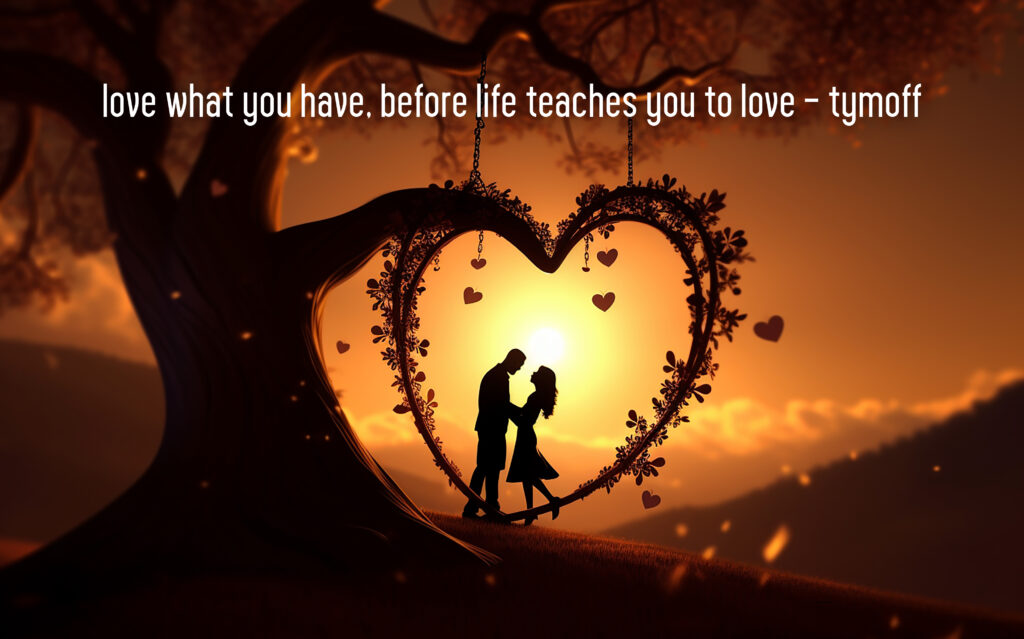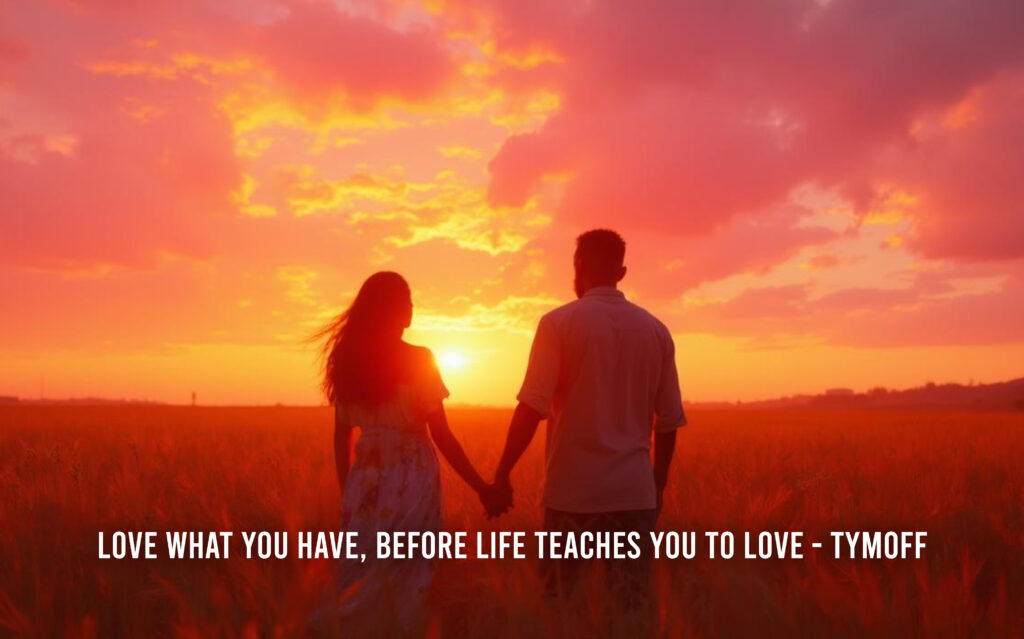Gratitude is a powerful emotion, often overlooked in the rush of daily life. We get caught up in the pursuit of more—more success, more material possessions, more recognition. But, as the saying goes, “Love What You Have, Before Life Teaches You to Lov – Tymoff.” These simple yet profound words encourage us to appreciate the blessings we already possess, before circumstances force us to do so.
At the heart of this phrase lies a timeless truth: we tend to take things for granted until life reminds us of their true value. Whether it’s our relationships, health, or even the small joys of everyday life, everything deserves appreciation. By embracing gratitude early on, we avoid the regret that often comes when life unexpectedly takes these things away.
Table of Contents
Why We Struggle to Love What We Have
In today’s fast-paced world, many of us are always looking forward, chasing the next big thing. Social media adds fuel to the fire by making us constantly aware of what others have, making it easy to feel dissatisfied with our own lives. This comparison trap is one of the biggest obstacles to appreciating what we have.
When we don’t stop to acknowledge our current blessings, life has a way of teaching us the hard way. For example, we may only realize the value of our health when it deteriorates or the worth of a loving relationship once it’s strained. “Love What You Have, Before Life Teaches You to Lov – Tymoff” urges us to be mindful of our blessings now, rather than waiting for life’s tough lessons to make us realize their importance.
On the other hand, practicing gratitude can shift our perspective entirely. When we focus on what we have, we find contentment, even in life’s simplest moments. This mindset keeps us grounded and helps us navigate life with greater peace and joy.
Love What You Have: The Benefits of Gratitude
Embracing the idea of “Love What You Have, Before Life Teaches You to Lov – Tymoff” comes with many benefits. Gratitude has been shown to improve mental health, increase happiness, and even strengthen relationships. When you focus on what you have rather than what you’re lacking, you’re more likely to experience positive emotions, like joy and contentment.
Furthermore, gratitude fosters resilience. Life is full of challenges, but people who practice gratitude tend to bounce back more easily from setbacks. They recognize that even in difficult times, there is something to be thankful for. In this way, loving what you have isn’t just a feel-good exercise—it’s a tool that helps you navigate the ups and downs of life.
In addition, when you love what you have, before life teaches you to lov – tymoff, you cultivate a mindset of abundance. You stop feeling as though you’re missing out, and instead, start feeling rich in ways that can’t be measured by money or possessions. This abundance mindset shifts your focus from scarcity to fulfillment.
How to Love What You Have, Before Life Teaches You to Lov – Tymoff
If you struggle with appreciating what you have, don’t worry—it’s a skill that can be learned over time. By incorporating a few simple practices into your daily life, you can cultivate a habit of gratitude.

- Practice Mindfulness: Mindfulness involves being present in the moment. Often, we miss the beauty of what we have because our minds are occupied with worries about the future or regrets from the past. By staying grounded in the present, you’ll be better able to recognize the good in your life.
- Keep a Gratitude Journal: Writing down what you’re grateful for each day can help shift your focus from what’s missing to what’s abundant in your life. Even on bad days, try to find at least one thing you appreciate, whether it’s a warm meal, a supportive friend, or a peaceful moment.
- Show Appreciation to Others: Gratitude isn’t just about appreciating things—it’s also about valuing the people in your life. Whether it’s thanking a friend for their support or expressing love to a family member, showing appreciation to others deepens your relationships and spreads positivity.
- Take Care of What You Have: Whether it’s your relationships, your body, or your possessions, taking care of what you already have shows that you value them. Don’t wait until something is gone or broken to realize its importance.
- Focus on What You Can Control: It’s easy to become frustrated by things we can’t change. But when you focus on what you can control—like your attitude, your actions, and your outlook—you begin to feel empowered and grateful for the opportunities in front of you.
The Consequences of Failing to Love What You Have
If we fail to appreciate what we have, life has a way of teaching us to love the hard way. Relationships that go neglected may falter, health that’s ignored may deteriorate, and time spent wishing for something better can never be regained. The regrets that stem from this can be profound.
One common example is the way people only appreciate their good health after they fall ill. For years, they might have complained about minor inconveniences like headaches or a busy schedule, but once their health takes a serious turn, they realize how valuable it was all along. Similarly, many people don’t appreciate the strength of their relationships until conflict or loss occurs. The lesson is clear: by appreciating what you have now, you avoid the painful experience of losing it later.
Love What You Have, and Life Will Reward You
“Love What You Have, Before Life Teaches You to Lov – Tymoff” is not just a reminder, it’s a guide for living a fulfilling life. When you embrace what you have with gratitude, life becomes richer and more meaningful. You feel more content, and this inner peace allows you to handle challenges with grace.
By cultivating gratitude, you’re not just changing your perspective for today—you’re setting yourself up for long-term happiness and well-being. When you practice loving what you have, life will reward you with a sense of peace that can’t be shaken by external circumstances.
In conclusion, remember that everything you need to live a full and happy life is likely already within your reach. You don’t have to wait for a life lesson to teach you to appreciate it. Start today, and love what you have before life teaches you to love.
Final Thoughts
The message behind “Love What You Have, Before Life Teaches You to Lov – Tymoff” is clear and profound. It’s about recognizing the value of what we already possess and embracing a mindset of gratitude. By practicing this approach to life, we can avoid the regret of lost opportunities and instead find joy in the present moment. Gratitude is not just an emotion—it’s a way of life that leads to greater fulfillment and happiness.


